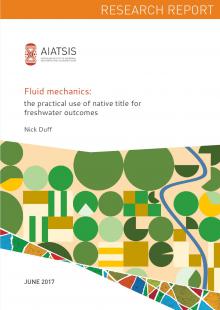Fluid mechanics: the practical use of native title for freshwater outcomes
“What rights do native title holders have in relation to freshwater resources?” — a question tackled by legal scholars, lawyers and native title holders for decades. This paper asks a different question: “Assuming they have rights relating to freshwater, what can native title holders do with those rights to promote or protect the things they value?”. It examines the interaction between native title and other areas of law that may impact on freshwater, including water legislation; approvals for mining, petroleum and infrastructure projects; and common law torts that govern land use.
The paper deals with two distinct types of situation. First, where native title holders want to do something with water, be it commercial irrigation or aquaculture, or the flooding of culturally significant ecosystems. Second, where native title holders want to protect freshwater resources from the impacts of other people’s activities, such as mine dewatering, fracking, dam projects, groundwater irrigation, or industrial pollution.
For the first scenario, the paper concludes that the Native Title Act 1993 privileges governments’ environmental and economic objectives over the claims of native title holders. Native title affords only limited exemptions to water licencing regimes and provides no legal basis to force governments to grant water licences. It does not provide any mechanism to use water for commercial purposes without a licence, other than for watering stock. Nevertheless, native title does provide some opportunities for leverage with government or industry, leverage that can be used creatively to gain legal access to water resources.
The outlook is slightly better in the second scenario. Here, native title provides much more tangible and direct legal tools to traditional owners: exclusive possession rights over land; the procedural rights under the future acts regime; the ability to participate in or challenge administrative decisions to approve new developments; the common law torts of nuisance, trespass and negligence; and various types of bargaining leverage, most significantly the right to compensation under the Native Title Act.
Water is an inherently tricky thing for the law to govern. The common law of water was replete with notions of reciprocity and standards of ‘reasonableness’, and the statutory regimes that have taken its place explicitly require the balancing of competing environmental, economic, social and cultural interests. Native title does not provide traditional owners with a trump card in this inherently political process, but it certainly does strengthen their hand.
